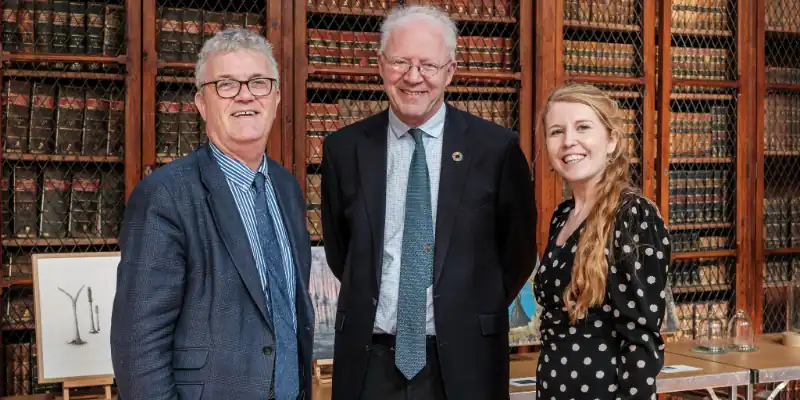Harnessing storytelling and the arts to inspire climate action 02 Apr 2025

- UCC workshop underscored storytelling and the arts as essential catalysts for effective climate communication and progress on the UN SDGs.
- Former UN Ambassador and co-founder of the 2030 SDG Agenda David Donoghue addressed the event.
- The workshop featured researchers from across UCC, research centres and partners including Met Éireann, Cork Chamber and the Glucksman.
How can storytelling, art, and creativity help drive real change in the face of the climate crisis? Former UN Ambassador David Donoghue, key negotiator of the 2030 Agenda for Sustainable Development, shared his perspectives at University College Cork (UCC).
Drawing on his experience facilitating the negotiations that shaped the Sustainable Development Goals (SDGs), Donoghue spoke about the power of the arts and humanities to elevate global efforts toward Climate Action (Goal 13). He highlighted creative arts-based sustainable development initiatives, including Screen Producers Ireland.
The interdisciplinary workshop, led by Dr Rosa Rogers of UCC’s School of English and Digital Humanities, explored how artistic expression - from poetry to virtual reality - can enhance climate communication, foster public engagement, and inspire meaningful action.
Opening the event, UCC President Professor John O’Halloran said: “The Arts have the unique power to build empathy and inspire pro-environmental action which are vital if we are to meet the SDGs. The climate crisis demands more than data - it needs stories that move people to act on a local and global level.”
The workshop showcased innovative research and creative collaborations including:
- A multimedia climate art exhibition on display in the Aula Maxima, which included visual art from artist and former physicist, Angela Gilmour, as well as artworks created by Amber Broughton, Gabhann Dunne and Chris Haughton, loaned by the Glucksman
- Virtual Reality Climate Films and spatial experiences with Dr Alexandra Covaci (Digital Arts, the University of Kent) and Irene Loriga (UCC School of Geography).
- Interactive presentations were then delivered by Dr Rosa Rogers, Dr Sarah Bezan (UCC School of English and Digital Humanities and UCC Radical Humanities Laboratory), Dr Alexandra Covaci (Digital Arts and Technology at UKC) and Dr Paul Holloway (UCC School of Geography and Principal Investigator at the Environmental Research Institute at UCC) exploring how interdisciplinary research can shape public understanding of climate risks.
Dr Paul Holloway shared his recent research conducted as part of TRANSLATE, an initiative to standardise climate projections, funded by Met Éireann. His case study about the threat of curlew bird extinction in Ireland was the basis of creative co-design story activities in poetic and VR forms led by Dr Alexandra Covaci and Dr Rosa Rogers.
The workshop was funded by the Future Humanities Institute, with research collaborations between the Eco-Humanities Research Group, the Centre for Arts Research and Practice and the Radical Humanities Laboratory.
What’s next
This workshop is part of a series that explores innovative and effective story approaches to climate communication. Attendees will walk away with strategies they can deploy in their own work to utilise storytelling for hope and action.
The next event will take place on 29 May 11-3pm in collaboration with Met Éireann's TRANSLATE project.
It will include presentations by Ambassador David Donoghue, UCC's TRANSLATE team, and also a pre-event sustainability walk, the day before the workshop, led by Dr John Barimo and Dr Gerard Mullaly.
To receive information on the next workshop, join the mailing list or contact Dr Rosa Rogers.